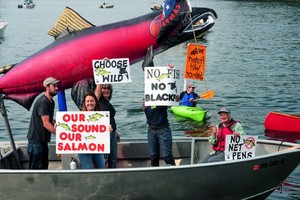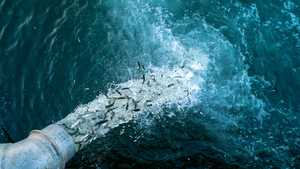 |
|||||||||||||||

Artifishal/ The Fight to Save Wild Salmon
Frontier Cafe-Ft. Andross, Brunswick
Thursday, July 11, 2019, 7:00 pmFarmed Salmon Protest, Photo: Ben Moon
In cooperation with Brunswick’s Frontier Cafe and Patagonia, Friends of Merrymeeting Bay (FOMB) is co-sponsoring the Thursday July 11 showing of Artifishal, a film of people, rivers, and the fight for the future of wild fish and environments that support them. It explores the wild salmon’s slide toward extinction, threats posed by fish hatcheries and fish farms, and our continued loss of faith in nature. Run time of the film is 1:27 and will be followed by a brief discussion of the issues with FOMB board member and Maine Department of Marine Resources fisheries biologist, Nate Gray.
Hatcheries when misused, dammed rivers and open-water fish farms are driving wild fish to extinction around the world. There is an urgent need to stop wasting money on failed plans and invest in science-based solutions to save endangered salmon, orcas and other apex predator fish.
For diadromous fish, hydroelectric dam licensing is a major problem with 20-50 year licenses the norm and not friendly to technological changes for fish passage during the license period. Consumers too can play a role in how we source the seafood we eat by ensuring it’s sustainable. And farmed fish, genetically engineered or not, can spread disease and weaken wild stocks by interbreeding. Stop hatcheries, reduce harvest and remove dams. The road to extinction is filled with good intentions but without great care, it’s a one-way street.
On May 5, 2005, FOMB along with Doug and Tim Watts and the Maine Toxics Action Coalition filed a petition with the National Marine Fisheries Services (NMFS) and US Fish and Wildlife Service (USFWS) to list Kennebec Atlantic salmon as an endangered species.
It had been 11 years since 1994 when the wildlife and fisheries agencies began taking Maine salmon tissue samples to determine population health of the species and still no decisions had been made so the ESA petition was filed.
According to Timothy Watts,
“During these 11 years the USFWS has taken no action to protect the wild Atlantic salmon of the Kennebec River under the U.S. Endangered Species Act. In Nov. 2000, following the publication of a National Academy of Sciences review of salmon genetics in Maine Rivers, the USFWS delineated a "Gulf of Maine DPS" (Distinct Population Segment) of Atlantic salmon, which included the Kennebec River, and its wild Atlantic salmon within its geographic bounds. At the same time, the USFWS specifically excluded wild Atlantic salmon in the Kennebec River ( and Androscoggin and Penobscot) from any protection under the U.S. Endangered Species Act. A half decade later, the USWFS has yet to take any steps to include wild Kennebec River Atlantic salmon in the Gulf of Maine DPS; nor has the agency published any timetable for such a decision to be made.”
Concern over anadromous fish restoration on the Kennebec River and Merrymeeting Bay is nothing new. Section. 4. of the 1818 Massachusetts Laws, Chapter CXXI contains: "An Act in addition to the several acts now in force for the preservation of Salmon, Shad and Alewives within the Counties of Cumberland, Lincoln, Kennebec and Oxford”
Penalties were described for those who would interfere with the fishery:
“Be it further enacted, That every person who shall drift or drag any net or seine in the waters of Kennebec River, at Merry-meeting bay, or in the Amareskoggin River, emptying into the same, so as to scrape the bottom, disturb or destroy any of the spawn or young of the salmon, shad or alewives, at any season of the year, he or they, so offending, shall forfeit and pay a fine of ten dollars for each and every offence, and shall moreover forfeit the net or seine and boat so used, to be disposed of according to the law passed on the twenty-second day of February, seventeen hundred ninety-four.”
NMFS and USFWS issued a 90-Day Finding regarding the salmon Petition on November 14, 2006 finding merit with the local groups request. Federal law requires an agency decision on a listing petition within one year of the 90-Day Finding. This did not happen so on February 16, 2008, represented by the Center for Biological Diversity (CBD) through attorney David Nicholas, the petitioners filed a Notice of Intent to sue the agencies which they did. Ultimately, threat of losing the lawsuit prompted agencies to make a decision June 15, 2009 on the listing petition, winning endangered species status for Atlantic salmon on Maine’s three largest rivers, the Kennebec, Androscoggin and Penobscot.
Today, despite continued hatchery efforts in Maine, Atlantic salmon populations in Maine are just hanging on. And, on January 31, 2011 FOMB and Environment Maine filed suit against dam owners on the lower Kennebec and Androscoggin Rivers for killing salmon and shad in violation of the ESA and Clean Water Act.
After the viewing Artifishal, focused mostly on fisheries in other geographic areas, discuss and learn from Nate Gray how Maine’s hatcheries work and don’t work and what viable alternatives may be for successful restoration of rivers, the vital arteries whose corridors are home to 60% of our species. The film advocates survival of wild species is necessary for our own.
Tickets for Artifishal are $9.00 and attendees are encouraged to purchase tickets in advance either online, in person, or by calling the Frontier box office at 725-5222 during operating hours.
FOMB’s Summer Outside! series is the warm weather counterpart to their popular Winter Speaker Series. Events are usually free and are open to the public. Their next outing will be a Lower Androscoggin River Kayak Paddle led by Michelle and Stan Moody on July 20. Please call Michelle at 406-5221 to pre-register and for times.
To receive more information about FOMB’s programs call Ed Friedman at 666-3372. The full Summer Outside! schedule is on the web at: www.fomb.org.
Watercolors by
Sarah Stapler
Sarah Stapler

